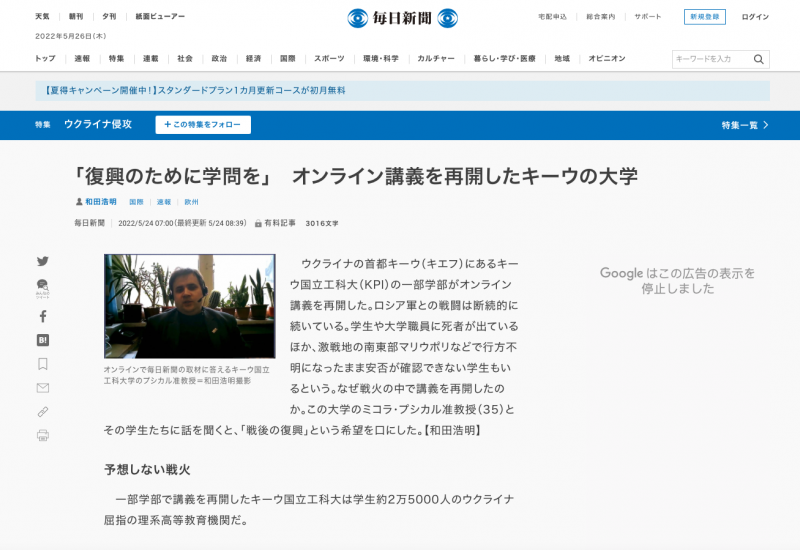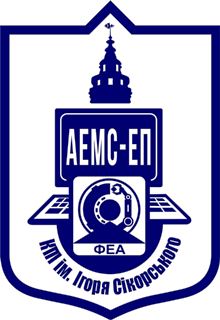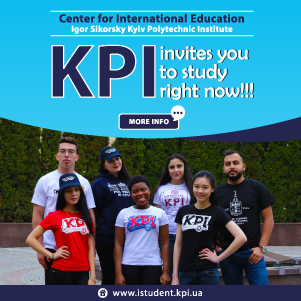Science for Recovery – the interview
Japanese journalist Hiroki Wada of the national newspaper The Mainichi, made the interview with the Deputy Dean in Education of Electrical Engineering and Automation faculty (FEA), Assoc. Prof., Ph.D. Automation of Electromechanical Systems and Electric Drive department Mykola Pushkar together with the department’s graduate student and young teacher Hanna Zemlyanukhina on the topic “Science for Recovery”.
Teachers described to the journalist the reasons for studies resumption at Igor Sikorsky KPI against the background of hostilities; about the inadmissibility of year study losing, as well as about the need for research and training of highly qualified bachelors and masters in electrical engineering to restore the infrastructure and equipment of the country’s energy system damaged by the war.

(с) The Mainichi – Japan Daily News
Excerpts from the full Hiroki Wada’s interview article (Japanese):
“Unexpected start of hostilities
Igor Sikorsky KPI resumed online learning at some faculties. It has about 25,000 students and ut is one of the best technical universities in Ukraine.
Prof. Pushkar works as the Deputy Dean for Educational Work at the Faculty of Electrical Engineering and Automation. Faculty trains specialists for various branches of energy, in particular for energy production and ensuring the functioning of energy systems. Due to the spread of the Coronavirus before the Russian full-scale invasion, lectures in early February were transferred from face-to-face format to online. About 800 students aged 18 to 25 study at the faculty. About 40% of them are from Kyiv, 60% – from the regions, so many went home.
On February 24, a military invasion of Russian troops began on the territory of Ukraine. “Teachers and students did not expect this. At first, there were a lot of people in Kyiv, all whose thoughts focused only on how to evacuate their families to safe places, ”Prof. Pushkar recalls.
The faculty also included residents of Bucha, Kyiv northwest, a city where Russian occupiers tortured, murdered, and sexually assaulted people.
One faculty member was able to evacuate with his family from Bucha on the second day of hostilities, when combat helicopters hovered over his home. He and his family escaped, but his house burned down. Another faculty member died in mid-March when a projectile hit a high-rise building in Obolon, northern Kyiv.
Fighting near the university
Fighting also took place near the university. The bullets hit the windows of buildings. Within a radius of 300 meters from the campus recorded the fall of a missile projectile. KPI workers and students were forced to evacuate. Some went to quieter regions of Ukraine, and some evacuated abroad.
We tried to connect with students scattered in different places. University student Anastasia Gorenko, 19, who was evacuated with her mother to Tallinn, the capital of Estonia, said: “I want to return to Kyiv as soon as possible and meet with my father, who serves in the territorial defense. I would like to go to Japan someday, ”she smiles. Anastasia is a fan of the Japanese anime “Attack of the Titans”.
There were also students who, having suspended their studies, volunteered for the Armed Forces or the Territorial Defense. There are at least 18 such students at the Faculty of Electrical Engineering and Automation. There are students who have become volunteers and volunteers. They repair and operate unmanned aerial vehicles in the combat zone to monitor and gather information. Two FEA students were killed in the war, and one went missing during fighting north of Kyiv. Several employees of the faculty serve in territorial defense. In fact, the entire university operates under martial law.
The basements of the university serve as a bomb shelter. Wireless access points have been set up so that you can use the Internet in the basement.
There are students who have lost their homes or cannot return home, so they still live in university dormitories. There are cases of evacuated families joining – the university and student organizations help them with food and clothing.
“Student organizations raise funds to help with the funeral of students whose parents died in the war; they send equipment, bulletproof vests and helmets to students who serve in the Armed Forces, etc., ”said Mr. Pushkar. To survive, everyone supports each other.
Desire to resume classes
In late March, when hostilities entered a protracted phase, students were interviewed about their desire to resume classes online. 95% answered that they want to resume classes. “Many students said that instead of listening to the air-raid sirens in the bomb shelters and reading the news of the war, we’d better get back to class.”
The teaching staff decided to introduce a “science for recovery” approach (ed.), Complete a course of lectures and conduct exams for students and graduate students. Mr Pushkar says: “If the war is canceled due to the war, it will mean a loss of one year for students. We want to avoid this and release bachelors and masters. ”
After the invasion of Russian troops, power grids and equipment in many parts of the country were damaged. The Chernobyl nuclear power plant in the north and the Zaporizhzhya nuclear power plant in the south have also been targeted by Russian troops and turned into war zones. Mr. Pushkar explains: “Among the specialists in the field of energy there are those who serve in the military, there are casualties. We have decided to resume classes in order to provide much-needed personnel to restore the infrastructure and equipment of our energy system damaged by the war. ”
Faculty members recorded video lectures and laboratory experiments and provided records to students, developed distance learning courses. Currently, more than 90% of students are actively studying in this mode.
At the same time, there are many students and teachers who lost their laptops due to the war. “Listening to lectures on a mobile phone is difficult. Computers are expensive. Students need support. ”
Mr Pushkar hopes to strengthen relations with Japan in the prospects of post-war reconstruction. Shibaur University, with which an agreement on academic cooperation has been concluded, provides lectures in English for students of KPI. Igor Sikorsky. By the end of April, six students had already listened to them.
Missing students in Mariupol
Even if online classes are resumed, the danger does not disappear. Victoria Lysenko left for her native Mariupol, an industrial city in the south of Ukraine, which was besieged. She lost contact with her online assignment on April 6.
“Two of my students have already died. I want her to be well, ”said Mr. Pushkar. Her parents then sent a short message: “The basement where my daughter was, after the Russian attack under the rubble.”
Due to the fact that Russian troops, who control the city, do not allow evacuation corridors, Victoria still remains “missing”. And her parents were sent to Russia, and so the connection with them was cut off. Mr. Pushkar is worried that they may be in special “filtration camps” where pro-Russian views are being assessed.
Student Anna Zemlyanukhina, a friend of Victoria, is currently in Kyiv.
She says: “We have few girls at the faculty, so we were very close to her. She hasn’t been in touch in a long time. In early April, she reported that I was in a bomb shelter. I’m fine”. I told her “If you need something, maybe send it to you through volunteers?”, But this message did not appear to be read. ”
Research with a view to the post-war period (Science for Recovery, ed.)
Anna is a third-year PhD student. She is researching technologies related to the use of solar energy. Anna says: “After the war, expectations for renewable energy will increase” – and there is a strong desire for her research to be useful in the reconstruction of Ukraine.
She is currently preparing to write a dissertation and complains: “It’s hard to concentrate when the sirens are constantly sounding.”
She lives in Kiev in an apartment with her parents. The bomb shelter is far from home, so when the siren sounds, the family moves into the hallway, where there are walls on all sides. “Because this place seems more or less safe.”
Her paternal grandparents live in Luhansk, where there are many pro-Russian people who feel a certain closeness to Russia. “But for me, their granddaughter, Russia is not just a neighboring country. If the conversation with grandparents is about politics, quarrels are inevitable, “she said.
Her mother’s acquaintance was tortured and killed by the Russian military. “I am just angry with Russia. I don’t understand why they do such horrible things to ordinary people. ” However, Anna adds: “I do not want to waste my emotions on Russian soldiers. What I want today is for the situation in Ukraine to stabilize and the war to end. ”
The ever-increasing volume and quality of Science for Recovery of the country is one of the decisive factors for a return to peaceful life and the development of society. (ed.)
We hope for the best, we believe in the defenders of the country. Glory to Ukraine.










